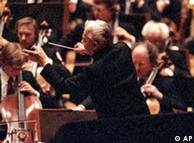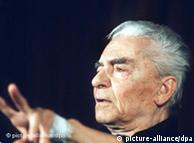Music | 03.04.2008
Critic Explains Allure of von Karajan, 100 Years and Counting
Ahead of the 100th anniversary of the birth of famous orchestra director and conductor Herbert von Karajan on April 5, DW-WORLD.DE talked about the maestro as a cultural icon with James Oestreich of The New York Times.
In 1955, von Karajan -- classical music's most prolific recording artist -- was named director of the Berlin Philharmonic Orchestra, and was credited with creating its clean and distinctive sound during his 35-year tenure. He was also chief conductor of the Vienna Symphony Orchestra, and the guiding force behind the Salzburg Festival, where he conducted for 33 years. Karajan died July 16, 1989.
DW-WORLD.DE spoke with James Oestreich, music and dance editor at The New York Times, about von Karajan's significance in music history.
DW-WORLD.DE: These days you can't look anywhere in the German media without seeing a story or documentary or article about the life of Herbert von Karajan. What's all the fuss about?
James Oestreich:He was probably the most recorded conductor of his time. It was a time when long-playing records were really taking off, and then digital recording came in and the CD came in, and he was riding that technology through the whole thing.
He recorded everything, all the time, and he re-recorded things. He recorded the Brahms symphonies three times, I believe, and the Beethoven symphonies three times. So he was simply everywhere.
To boot, he was in many ways a fantastic conductor. He had his shortcomings, as many people do. But what he did well, he did extremely well. And he had at that time one of the world's greatest orchestras, if not the world's greatest orchestra, performing for him.
to bootOLD-FASHIONED
in addition; also:
He's kind, handsome and wealthy to boot.
 Bildunterschrift: Karajan conducts the Berlin Philharmonic in 1987
Bildunterschrift: Karajan conducts the Berlin Philharmonic in 1987Can you name a highlight?
His 1960s recordings of the Beethoven symphonies were classic. They were the way I, among many others, got to know the Beethoven symphonies. So they were kind of my standard, and many people's standard for those works.
What effect does a superstar conductor have on an orchestra? Is it purely good news -- more revenue and publicity -- or can it also be damaging?
Well it can be either. In this case, he and the orchestra were so closely identified after so many years, and it was the coming together of two superstar names: Karajan and the Berlin Philharmonic. ... A music director isn't just a conductor. He is someone who builds the orchestra in addition to conducting it. In this case, Karajan had built up this orchestra over a number of years, and made it into a sensational machine. They played beautifully for him.
To what do you attribute the ongoing interest in Karajan?
Well, there is the factor of permanence, for one thing. It helps Karajan and hurts people today. It used to be that people's vinyl LPs would wear down and become unplayable. Now, digital recordings are permanent. So there are these recordings that were the standard of their time, and they remain with us, and become standards of this time, too.
It makes it difficult for people to come up with recording projects today, because all these standards are still readily available.
In Karajan's case, there was also this international renown that he had. When Japan was warming to classical music -- to put it mildly -- 20 or 30 years ago, Karajan was almost synonymous with classical music there. So there is a built-in audience all around the world for his recordings.
Karajan had an international career, but was still very much a German and Austrian conductor. Now an Englishman, Sir Simon Rattle, leads the Berlin Philharmonic. Does nationality have a role in orchestras today?
It has become less relevant. It used to be that orchestras from different countries had different sounds -- the Russians had very piercing brass instruments, the Germans had tremendous warmth in their string sound. As conductors travel around the world, and players go from orchestra to orchestra, and sometimes from country to country, those things have greatly diminished, in the last 30 or 40 years.
That's the way of the world. But some of us yearn, to some extent, for the old days, when there were those characteristic sounds of orchestras. When nobody could play German music like the Germans and nobody could play French music like the French.
One of the most frequently debated aspects of Karajan's life is the fact that he joined the Nazi party in 1933. Modern biographers have argued it was a political career move, rather than an ideological one. Still, he conducted for Hitler and other top Nazis, who revered him. How important is this aspect of his biography?
 Bildunterschrift: Großansicht des Bildes mit der Bildunterschrift: German composer and conductor Richard Strauss
Bildunterschrift: Großansicht des Bildes mit der Bildunterschrift: German composer and conductor Richard StraussWell, it is a very important aspect. And he is far from alone in any of this. [German conductor Wilhelm] Furtwaengler, of course, had many of the same problems ... and [German composer] Richard Strauss was the head of the Nazi music chamber. So Karajan was far from alone.
It's a very unfortunate aspect of his biography, but it doesn't mitigate his music making in any way, I don't think. There were a lot of bad things happening in those days, and he was part of it.
If you read about Karajan in the press, it is hard to find anyone neutral. The musicians who played for him adored him, as did a large public. Yet many writers today criticize his sound as being too "cold" and technical, and take his perfectionism to task. What's your take?
Well, I don't find his music making cold. It was certainly very lush, and that was problematic in some ways. I remember a recording came out of Bach and Stravinsky, and for me the funny thing about that record is that Karajan was out of his depth on both ends. His big, lush Bach sound is totally out of date today, now that the early music movement has brought back the smallness of sound from the Baroque era. And in the case of Stravinsky -- a very angular, modern sound -- again, Karajan's sound is very lush and rich. It missed the angles and it missed a lot of the music as a result.
So, it was a style that didn't suit all types of music, but the music it suited, it suited very well. There is a recording late in his life of Mahler's 9th Symphony that is the opposite of cold. Its one of the great recordings ever made. So I'm not sure what people have in mind when they use a blanket term like cold to describe his music making.
Karajan was also known for leading an extravagant lifestyle, flying jets and driving race cars. He was also criticized by some for ostensibly forcing concert ticket prices so high that only the wealthy could attend. How did this affect the public's view of him?
 Bildunterschrift: Großansicht des Bildes mit der Bildunterschrift: Karajan steps off the jet with his wife, Eliette (left) and daughter Isabella
Bildunterschrift: Großansicht des Bildes mit der Bildunterschrift: Karajan steps off the jet with his wife, Eliette (left) and daughter IsabellaWell, I don't think Karajan set concert prices. Karajan certainly made a lot of money and demanded a lot of money, but he wasn't alone in that. Concerts were very expensive, especially at Salzburg. But it is far from just Karajan. Yo Yo Ma, Itzhak Perlman -- all sorts of people were demanding huge amounts of money. And that's what sent ticket prices soaring.
So did his luxury lifestyle image act in his favor, or against him?
I think it humanized him. Toscanini was put on a pedestal by music lovers for a long time. In this case it brought Karajan in to a real world that people could identify with, or wished they had ... I'm sure the image was certainly part of the package.
How do you suppose Karajan will be remembered?
I think there are a lot of generalizations going around this year, and I think generalizations are always risky. I don't want to see him swamped, and go down in history with words like "cold" attached and "luxury" attached. He was many things. He was a very complex figure, and he was a great musician.
***
2005年 su之作:「卡拉揚訪談錄」與《群眾與權力》
「卡拉揚訪談錄」(英)理查德•奧斯本編著,秦啟越譯,北京:東方出版社,2004
(Conversations with Karajan Osborne, Richard (edit.), Oxford University Press, 1989)
這本書,日本高橋 伯夫 翻譯為「カラヤンの遺言」(On music);Richard Osborne 還著有Herbert von Karajan: A Life in Music 。
事實上,「卡拉揚訪談錄」與他接受牛津大學榮譽博士學位有關 – 我從中才知道;授榮譽博士學位的講詞,有拉丁文和英文對照本--hc 今天學到:英國仍用calvity (KAL-vi-ti) also calvities, noun 表示Baldness. [From Latin calvities (baldness), from calv-us (bald).] )。
多次提到與英國名作曲家William Walton(1902-83) 的恩怨(p.150;此頁關於William Walton傳記書名誤寫為『沃爾德畫像』)。
The music and magic of words --卡拉揚能流利說英語。
由於Herbert von Karajan的錄音和錄影等作品,堆積起來豈只等身(案:他自己投資拍四十多部影片—胡金銓跟他見過面,未果.......)
我們可以從中了解他的"工作狂熱"和他對於許多作品-作家的感受、美學和要求(譬如說,他絕對不允許在影片中打字幕)、交往感想(全世界的劇院不合作;音樂家之間相喜相輕……)。
卡拉揚訪談錄中也會提到卡內提Elias Canetti (1905-1994)談的「指揮與權力」---其實,我相信《群眾與權力》*是「power諸面向」的筆記,所以可以抽讀這篇。
可惜翻譯本無索引, 否則可以很容易找到它有無關於Max Weber 提的charisma ( as a "gift of grace" that allowed people to captivate others.) 不過,《群眾與權力》 類似「綜合科學」的研究。所以,一般認為「卡內提的 power觀念,對於普遍人(我為其中之一)而言並不容易懂;然而,馬拉喀什之聲、天籟……或許可及。」**
有些道理,不過,我們真正懂得多少概念與現象。
*《群眾與權力》(Masse und Macht, 1960)黃漢青 陳衛平譯,臺北:成均,1982(大陸似乎前年才有翻譯本?)
**《聆聽馬拉喀什:摩洛哥古都漫遊》林維傑譯,臺北:馬可波羅,2004
滄海一粟之惑
"Every artist must have two fears--the fear of God and the fear of man--fear of God that his creation will ultimately be found unworthy and the fear of man that he will be misunderstood by his fellows."
【有樂好讀|揭秘指揮藝術】
卡拉揚(Herbert von Karajan)在一次與維也納愛樂音樂會的排練過程中,與波哥雷里西(Ivo Pogorelich)在排練柴科夫斯基的《降B小調第一號鋼琴協奏曲》時,因為兩人對樂曲速度的見解不同而取消此曲的演出,使得維也納愛樂做了一次有史以來最短的音樂會演出──全場只演出柴科夫斯基《羅密歐與茱麗葉》一曲而已。話說在排練此曲的過程的當中,近樂曲結束處,也就是在再現部結束音樂只剩下沈重的低音旋律之後,音樂進入嘆息般的間奏時,定音鼓手把拍子弄錯了,將短音符打在後半拍而不是正拍上,試了兩三次都合不在一起,指揮時經常是緊閉雙眼、彎腰向下的卡拉揚抬起身來張開雙眼說:「這怎麼回事?」接下去發生的事更是匪夷所思,樂團首席Gerhart Hetzel(1940-1992)突然開口說:
「定音鼓錯了!拍子弄錯了!」卡拉揚轉頭對定音鼓手說:「知道了嗎!」然後又若無其事的繼續練習下去。
「定音鼓錯了!拍子弄錯了!」卡拉揚轉頭對定音鼓手說:「知道了嗎!」然後又若無其事的繼續練習下去。
--摘自《MUZIK古典樂刊》No.35
